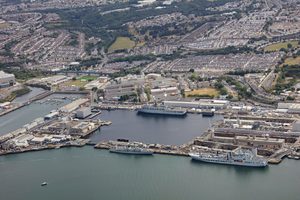Environment Agency consults on Devonport permit variation

Have your say on a proposed change to the way rainwater contaminated by trace amounts of radioactivity is disposed of at HMNB Devonport
Image credit: HMNB Devonport
Her Majesty’s Naval Base (HMNB) Devonport wishes to change the way it disposes of trace contaminated rainwater. At present it passes through the effluent treatment plant operated by the neighbouring nuclear site, Devonport Royal Dockyard Ltd. HMNB Devonport now wants to release the rainwater directly into the River Tamar/Hamoaze. This will result in a very minor increase in dose to the public – equal to less than five minutes of the average annual background radiation dose in the UK.
Operators of nuclear sites in England must have a permit for activities involving radioactive substances from the Environment Agency. As HMNB Devonport is operated by the Ministry of Defence, it does not need an environmental permit but instead has an ‘Approval’ from the agency to receive and dispose of radioactive waste as part of submarine operations and maintenance.The operator now wishes to vary this approval to reflect their proposed change to disposing of rainwater.
The environmental permitting process is designed to ensure sites are operated without causing significant harm to the environment and human health. The Environment Agency will consult relevant technical experts on the technical detail of the permit variation and invite comments from the public before a decision is made on whether or not to vary the permit.
You can view a copy of the application for a variation and supporting documents and comment online at https://consult.environment-agency.gov.uk/nuclear/application-to-vary-the-radioactive-substances-app/ or email nuclear@environment-agency.gov.uk quoting reference EPR/LB3730DK. Paper copies are available from our Customer Contact Centre on 03708 506 506. We may charge to cover copying costs.
Comments should be sent to the Environment Agency by Tuesday 27 July 2021. Please note we can only consider issues covered by the environmental permit. We will then review all comments before making our final decision on whether or not to vary the approval.
Last updated 30 June 2021 + show all updates
-
Edit added to explain the average annual background radiation dose in UK.
-
First published.